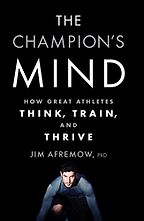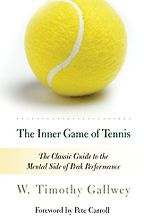Books by Jim Afremow
“He talks about greatness, and how to learn it from other people: to look around your sport world, the coaches and athletes at every level, Olympic, pro, national, local, and notice what you like or admire in those people. He says, if you can notice some of these elements, that must mean you have some of those elements in yourself, that you could develop. That’s a big message he sends.” Read more...
The best books on Sports Psychology
Bill Cole, Sportspersons & Sportswriter
Interviews where books by Jim Afremow were recommended
-

1
The Inner Game of Tennis
by W. Timothy Gallwey -

2
Golf Is Not A Game Of Perfect
by Bob Rotella -

3
Zen Putting: Mastering the Mental Game on the Greens
by Joseph Parent -

4
Heads-Up Baseball: Playing the Game One Pitch at a Time
by Ken Ravizza & Tom Hanson -

5
The Champion’s Mind: How Great Athletes Think, Train, And Thrive
by Jim Afremow
The best books on Sports Psychology, recommended by Bill Cole
The best books on Sports Psychology, recommended by Bill Cole
What do you think about when you’re training at the gym, or on the tennis court? And what should you think about, if your goal is maximizing performance and results? Seasoned sports psychologist Bill Cole, coach for numerous Olympic teams and top-level international athletes, reveals that the number one road block to athletic performance often isn’t physical—it’s overthinking.




